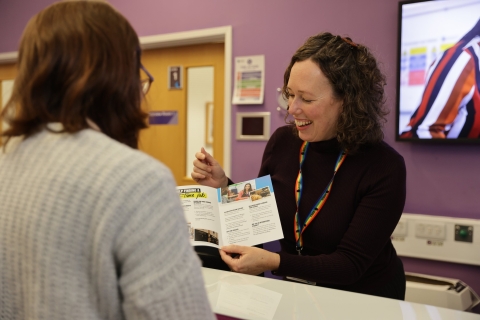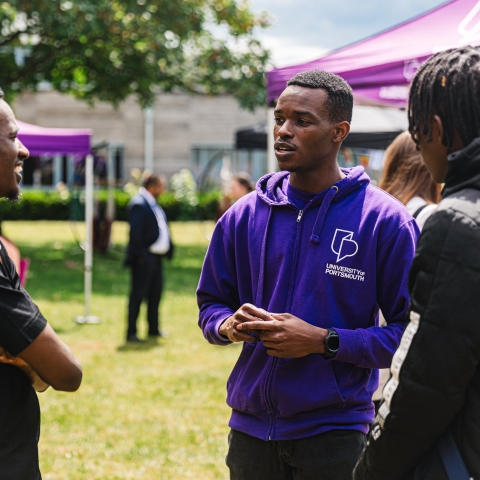

After you graduate
Your options for working in the UK
There are many options available for international students to stay in the UK after they graduate. Our online guide provides further information about the graduate jobs market in the UK and how to find job roles and employers with a sponsorship license.
Don't forget to work through the Graduate Job Options and What UK Employers Want Target pathways.
On this page:
Visa Guidance
To understand your visa options after graduation, visit our Visa Options and Considerations page.
Types of graduate opportunities
There are two main paths to getting into graduate employment - graduate jobs and graduate schemes. Each has its advantages and our Advisers can help you choose the right one for you. Remember, we offer support for graduates for up to 5 years after graduation.
Here are the key differences between graduate jobs and schemes.
A “Graduate job” refers to any entry-level role with the requirement for at least an undergraduate-level education.
When to apply for a graduate job
You should start looking out for these vacancies a couple of months before the end of your course. Vacancies are advertised when the need arises and employers will normally want someone in post within a couple of months.
Where to find graduate jobs
Graduate schemes are training programmes that are typically offered by large employers and last between 12 months and three years.
The defined time frame of the scheme is the main thing that sets these opportunities apart from the wider definition of a ‘graduate job’. Graduate schemes are typically offered industries including:
- Banking
- Finance
- Accounting
- Technology
- Engineering
- Business
Employers often consider candidates from any subject background.
An advantage of a graduate scheme is that employees rotate between different departments throughout their training. Graduates may work with the employer permanently or apply to other roles once their training is complete.
When to apply for a graduate scheme
The typical application and recruitment window for graduate schemes is from September onwards, with a start date of the following summer and/or September. Some organisations will have a more flexible approach and some will have rolling application deadlines.
Where to find graduate schemes
Explore more information about graduate schemes using the links below:
- GradTouch - What’s the difference between a grad job and a grad scheme?
- TARGETjobs - Graduate schemes and graduate training
- TARGETjobs - Search for graduate schemes
- Prospects - Graduate schemes
- Bright Network - Application deadlines for graduate schemes
Recruitment process in the UK
Most graduate employers may have their own recruitment processes to fit their priorities and the skills they’re looking for. However, they all tend to feature similar steps. You can expect to complete a combination of the following:
- Online Application Form: Traditional forms typically ask for your personal details, educational background, and work experience. You might also answer questions like "Why do you want to work for this company?" or upload your CV. Strengths-based forms, on the other hand, are a bit simpler—they start with a basic application followed by a series of video tests.
- CV and Cover Letter: You may be asked to provide a CV and cover letter, either in addition to or instead of an online application form.
- Psychometric Tests: These include online assessments like personality quizzes, numerical or verbal reasoning tests, and situational judgment tests. In strengths-based processes, you might also encounter ‘immersive experience’ video tests that present scenarios and ask how you’d handle them.
- Interviews (Face-to-Face, Telephone, or Video): Your first interview usually focuses on your general skills, competencies, and enthusiasm for the role. Later interviews might dive deeper into your job-specific abilities, awareness of the industry, knowledge of the company, and your strengths and values.
- Assessment Centre: This is like a group interview where candidates participate in group activities, presentations, case studies, and a final interview. Assessment centres can be held in person or virtually.
- Technical Interview: For roles in fields like engineering, you may also need to complete a technical interview, either during the assessment centre or on a separate day.
You will likely only need to complete 2 or 3 of these steps but some larger organisations may ask for all to be completed.
Get support with your CVs, applications and interviews by visiting the Career Essentials section of our website, or speaking to a member of our team.
Finding jobs and employers
Once you have decided on the type of graduate opportunity you are interested in, you can start searching for roles. In the UK, the majority of job searching is conducted through online jobs boards including MyCareer, Indeed and Prospects. Our Career Guides provide further resources for sector-specific roles.
Networking and attending events is also a great way to meet employers and learn about opportunities before they become available.
Our Graduate Jobs Guide provides further resources and tips on how to make the most out of your job search.

Student Circus
As a University of Portsmouth Student, you get access to Student Circus - a specialised jobs board designed for international students in the UK, focusing on roles that offer visa sponsorship. It connects you with verified employers willing to sponsor work visas, streamlining the job search process for those navigating immigration requirements.
Finding licensed sponsorship employers
If you have a Graduate Visa, you don’t need an employer to sponsor you for a job in the UK. However, if you’re aiming for a Skilled Worker Visa or a temporary work visa, you’ll need a job with an employer who is a licensed sponsor. You can find these employers on the GOV.UK register of licensed sponsors, though it can be tricky to search.
If you’re interested in a company that isn’t currently a licensed sponsor, you can ask if they’re willing to apply for sponsorship; once approved, you could work for them. Generally, larger companies are more likely to be sponsors, but it’s always good to check with the HR department of any company to confirm their status.

Get support with your graduate job applications
We're available Monday-Friday for 1-1 appointments. We can support you with:
- Career options
- Graduate job search
- CVs, cover letters and applications
- Interviews and assessment centres
Just book in with our Advisers.
Explore the International Student Career Guide
International student career guide
Find out about the regulations for finding work in the UK as an international student

Working and building experience in the UK during your studies
Learn how we can support you in securing part-time work, volunteering and placements.

Starting a business in the UK
Learn more about the rules around starting your own business as an international student or graduate, and how we can support you.

Visa options and considerations
Understand the options you have and the considerations you need to take when building your career in the UK as an international student.

Enable University alerts
Turn on notifications for critical updates like closures, safety alerts, and urgent service disruptions.





